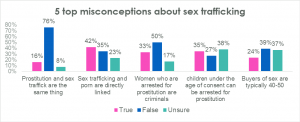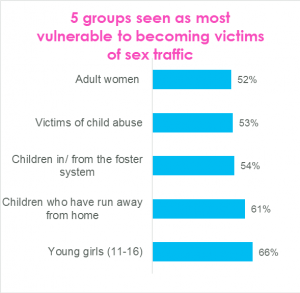 Change.org
Change.orgFavorite
Survey Says Americans More Threatened by Human Trafficking than Terrorism
According to a new national survey by market research firm Opinium and the Selah Way Foundation, sex trafficking is regarded as one of the most problematic crimes within the United States. Fifty three percent of the over 2,000 American adults surveyed said that they see sex trafficking as a large problem within their country, seeing it as a more urgent issue than both terrorism and hate crimes.
When asked where they think sex trafficking most commonly occurs, 76 percent of people said the United States, followed by 58 percent saying Africa and 57 percent saying Russia. When it comes assessing the risk of sex trafficking in their local area, 59 percent overall thought that there is a high to medium risk. This number rose to 64 percent in the southeastern United States and fell to 48 percent in the northeastern United States.
Other highlights of the survey results include:
- Two in five Americans feel they have very little or no knowledge about sex trafficking, and while the awareness of the issue around sex trafficking is high, the knowledge and understanding on the matter is less so.
- Two thirds of people stated that they do not feel confident in their ability to detect whether someone may be a sex trafficker. A similar amount feel that they would not be able to detect if someone was being used for sex trafficking (63 percent).
- Confidence grows in two thirds of American adults, as they feel they know who to contact if they suspected that sex traffic was occurring (67 percent). A similar amount feel they would know how to explain sex traffic and the associated risks to others (66 percent).
- Seven in 10 people felt confident that they can protect themselves from sex traffickers (71 percent), this reaches a high of 80 percent in northeast New England and lowers to 67 percent in the southeast central and west Pacific United States.
- For those who have at least a little or no knowledge on the topic of sex trafficking, the majority are getting this from media sources (news 61 percent and television 54 percent) while the role of social interaction also plays a pivotal role in educating Americans on the matter (social media 37 percent and friends and family 24 percent). Social Media is the number one source of information for 18 – 24-year-olds (61 percent).
- Seventy six percent of those surveyed confused sex work with sex trafficking, equating them to be the same thing.
- When asked to explore the type of persons who may be vulnerable to becoming a victim of sex trafficking, two thirds feel young girls are most at risk (66 percent). This is followed by children who have run away from home (61 percent) or are/have been in the foster system (54 percent). Although, a sixth of people think that there are no demographics or circumstances which put one group more at risk more than any other (16 percent).
- Just over a third of people (37 percent) believe it is everyone’s responsibility to help tackle sex trafficking
- The FBI is seen as being at the forefront for tackling sex trafficking within the US, as 42 percent said it should be their responsibility to tackle the issue. This is however closely followed by local police/ sheriffs (39 percent) and the Government (36 percent).
- Those polled believe that children should be educated about sex trafficking at around the age of 10 and a half years old, on average through the school and education system (78 percent). For those who do think children should receive education regarding sex trafficking, nine in 10 think they should be given the knowledge on how to spot predatory behavior (90 percent). This is followed by learning the tools needed to stay safe online (84 percent) and who to contact if they suspect a sex trafficker (77 percent).
James Endersby, CEO of Opinium, commented, “Our nationwide study exposes the high levels of misunderstanding around the issue of sex trafficking in America. There is a very clear need for vastly improved levels of education nationally on the dangers and signs of sex trafficking, as well as increased impetus to arm children with a toolkit to improve their awareness too, and to protect themselves and others.”
Elizabeth Melendez Fisher Good, CEO/Co-Founder of Selah Freedom & The Selah Way Foundation, adds “we are so grateful to Opinium for partnering with us in our mission to bring greater awareness to the public about sex trafficking. This survey will be one of several we hope to generate in 2020 to bring light into the darkness of sex trafficking and lead America in solutions to eradicate exploitation.”









0 comments